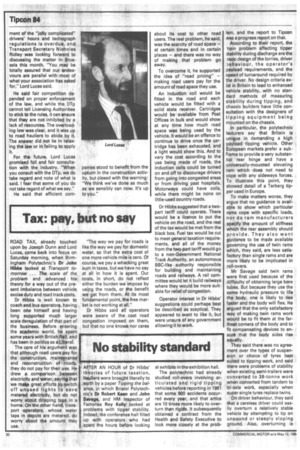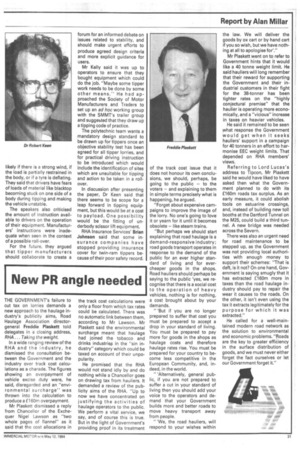No stability standard
Page 32

Page 33

If you've noticed an error in this article please click here to report it so we can fix it.
AFTER AN HOUR of Dr Hibbs' theories of future taxation, hiciuliers were brought literally to earth by a paper Tipping the balance, in which Bristol Polytechnic's Dr Robert Keen and John Savage, and HM Inspector of Factories Roy Kellylooked at problems with tipper stability. Indeed, the conference hall filled up with operators who had spent the hours before looking
at exhibits in the exhibition hall.
The polytechnic had already studied roll-overs involving articulated and rigid tipping vehicles before reporting in 1981 that some 900 accidents occurred every year, and that artics are 10 times more likely to overturn than rigids. It subsequently obtained a cotitract from the Health and Safety Executive to look more closely at the prob
lem, and the report to Tipcon
as a progress report on that.
According to their report, the "nein problem affecting tipper stability during discharge are the Pasic design of the lorries, driver )ehaviour, the operator's payload requirements, and the speed of turnaround required by the driver. No design criteria exist in Britain to lead to enhanced vehicle stability, with no standard methods of measuring stability during tipping, and chassis builders have little consultation with the designers of tipping equipment being mounted on the chassis.
In particular, the polytechnic lecturers say that Britain is unique in demanding a high payload tipping vehicle. Other European markets prefer a subframe to provide a very substantial rear hinge and have a universally-mounted elevating ram which does not need to cope with any sideways forces. To illustrate this point, they showed detail of a Terberg tipper used in Europe.
To make matters worse, they argue that no guidance is available to show which particular rams cope with specific loads, nor do ram manufacturers speedy the amount of stiffness which the rear assembly should provide. They also want guidance to be made available governing the use of twin rams which, they said, are less satisfactory than single rams and are more likely to be implicated in roll-overs.
Mr Savage said twin rams were first used because of the difficulty of obtaining large bore tubes. But because they use the same hydraulic pressure to life the body, one is likely to rise faster and the body will flex. He argued that the only satisfactory way of making twin rams work would be to fit them at the farthest corners of the body and to fit compensating devices to ensure that the body sides rise equally.
They said there was no agreement over the types of suspension or choice of tyres best suited to tipping work, and said there were problems of stability when existing semi-trailers were converted to 38-tonne work when converted from tandem to tri-axle work, especially when super single tyres replace twins.
On driver behaviour, they said that a careless driver could easily overturn a relatively stable vehicle by attempting to tip on unsound or steeply sloping ground. Also, overturning is
likely if there is a strong wind, if the load is partially restrained in the body, or if a tyre is deflating. They said that drivers have fears of loads of material like blacktop becoming stuck on one side of a body during tipping and making the vehicle unstable.
The speakers also criticised the amount of instruction available to drivers on the operation of their equipment. Manufacturers' instructions were inadequate when seen in the context of a possible roll-over.
For the future, they argued that tipper manufacturers should collaborate to create a forum for an informed debate on issues related to stability, and should make urgent efforts to produce agreed design criteria and more explicit guidance for users.
Mr Kelly said it was up to operators to ensure that they bought equipment which could do the job. "Maybe some tipper work needs to be done by some other means." He had approached the Society of Motor Manufacturers. and Traders to set up an ad hoc working group with the SMMT's trailer group and suggested that they draw up a tipping code of practice, The polytechnic team wants a mandatory design standard to be drawn up for tippers once an objective stability test has been agreed for all tipper lorries, and for practical driving instruction to be introduced which would include the identification of sites which are unsuitable for tipping and action to be taken in a rollover.
In discussion after presenting the paper, Dr Keen said that there seems to be scope for a leap forward in tipping equipment, but this would be at a cost to payload. One possibility would be the fitting of underbody scissor lift equipment.
RHA Insurance Services' Brian Johnson said that some insurance companies have stopped providing insurance cover for twin-ram tippers because of their poor safety record.












































































































